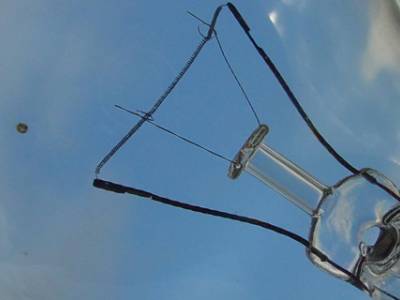Hi all,
I am looking for a good program in Asia for entrepreneurship especially in cleantech. I will have to decide between INSEAD Singapore, HK UST, NTU, NUS and CEIBS. I like HKUST and NTU since they have good engineering schools associated and both seem to make reasonable efforts to help commercialization. On the other hand INSEAD seems to have by far the most active student run energy club.
Any thoughts?
ASIAN MBA in entrepreneurship and cleantech
Posted May 04, 2009 20:05
I am looking for a good program in Asia for entrepreneurship especially in cleantech. I will have to decide between INSEAD Singapore, HK UST, NTU, NUS and CEIBS. I like HKUST and NTU since they have good engineering schools associated and both seem to make reasonable efforts to help commercialization. On the other hand INSEAD seems to have by far the most active student run energy club.
Any thoughts?
Posted May 05, 2009 05:09
I graduated from the Tsinghua MBA in a cleantech last year - now working in a Clean Tech VC/ Carbon Trading Company.
Tsinghua has one of the best engineering schools in the world. Their professors are reknown solar experts within China who regularly work with Suntech and other listed Chinese solar companies. MBA students can join the renewable energy club which attracts Tsinghua's best engineers - (I have 30 Chinese friends all getting the PHds in nuclear engineering from Tsinghua from that club). Tsinghua is on the forefront of Clean Coal Technology - any VC from California investing in China Clean Tech knows Tsinghua and the best usually have partnerships with them. Some Tsinghua foreign graduates, who did their senior projects on the China's domestic coal market, got jobs in Coal Trading with big firms and now live throughout Asia.
The MBA Building is shared with the BP Renewable Energy Lab - side note - Tsinghua is the only school that BP recruits MBA candidates in China. The Tsinghua Science Park has about 5 to 10 clean tech startups.
Also, all the big carbon decisions for carbon markets will be done in Beijing with the government - being in this circle is pretty essential for foreigners since carbon markets are global, as opposed to many of the other industries where getting a job is quite tough. Granted, many MBA graduates are going after Chinese wind turbine companies looking to do some M&A or expand to global markets and need a foreigner or two.
Having said that - Chinese is very important (unless you do carbon markets) if you want to work in China. If you want to work in an Investment Bank Environmental Department - most banks require fluency when they recruit at Tsinghua, unless you have good contacts.
Tsinghua has one of the best engineering schools in the world. Their professors are reknown solar experts within China who regularly work with Suntech and other listed Chinese solar companies. MBA students can join the renewable energy club which attracts Tsinghua's best engineers - (I have 30 Chinese friends all getting the PHds in nuclear engineering from Tsinghua from that club). Tsinghua is on the forefront of Clean Coal Technology - any VC from California investing in China Clean Tech knows Tsinghua and the best usually have partnerships with them. Some Tsinghua foreign graduates, who did their senior projects on the China's domestic coal market, got jobs in Coal Trading with big firms and now live throughout Asia.
The MBA Building is shared with the BP Renewable Energy Lab - side note - Tsinghua is the only school that BP recruits MBA candidates in China. The Tsinghua Science Park has about 5 to 10 clean tech startups.
Also, all the big carbon decisions for carbon markets will be done in Beijing with the government - being in this circle is pretty essential for foreigners since carbon markets are global, as opposed to many of the other industries where getting a job is quite tough. Granted, many MBA graduates are going after Chinese wind turbine companies looking to do some M&A or expand to global markets and need a foreigner or two.
Having said that - Chinese is very important (unless you do carbon markets) if you want to work in China. If you want to work in an Investment Bank Environmental Department - most banks require fluency when they recruit at Tsinghua, unless you have good contacts.
Posted May 10, 2009 22:17
Thanks for that information. I realize that Tsinghua is a great place for MBA/technical mingling. HKUST has that same advantage and I was planning to spend time in Beijing at the end of my studies for my electives.
Internationally, Tsinghua's MBA is not very well recognized which is why I am opting for CEIBS and HKUST.
To do business in Mainland China, how much of a disadvantage will it be to have studied in Hong Kong versus the Mainland?
Internationally, Tsinghua's MBA is not very well recognized which is why I am opting for CEIBS and HKUST.
To do business in Mainland China, how much of a disadvantage will it be to have studied in Hong Kong versus the Mainland?
Posted May 11, 2009 17:06
I think that if you would search this forum for a bit (look for posts about Asian schools), you would find some answers to that question! From what I gather, it does make a difference....
Posted Aug 06, 2009 16:47
I graduated from the Tsinghua MBA in a cleantech last year - now working in a Clean Tech VC/ Carbon Trading Company.
Tsinghua has one of the best engineering schools in the world. Their professors are reknown solar experts within China who regularly work with Suntech and other listed Chinese solar companies. MBA students can join the renewable energy club which attracts Tsinghua's best engineers - (I have 30 Chinese friends all getting the PHds in nuclear engineering from Tsinghua from that club). Tsinghua is on the forefront of Clean Coal Technology - any VC from California investing in China Clean Tech knows Tsinghua and the best usually have partnerships with them. Some Tsinghua foreign graduates, who did their senior projects on the China's domestic coal market, got jobs in Coal Trading with big firms and now live throughout Asia.
The MBA Building is shared with the BP Renewable Energy Lab - side note - Tsinghua is the only school that BP recruits MBA candidates in China. The Tsinghua Science Park has about 5 to 10 clean tech startups.
Also, all the big carbon decisions for carbon markets will be done in Beijing with the government - being in this circle is pretty essential for foreigners since carbon markets are global, as opposed to many of the other industries where getting a job is quite tough. Granted, many MBA graduates are going after Chinese wind turbine companies looking to do some M&A or expand to global markets and need a foreigner or two.
Having said that - Chinese is very important (unless you do carbon markets) if you want to work in China. If you want to work in an Investment Bank Environmental Department - most banks require fluency when they recruit at Tsinghua, unless you have good contacts.
really seek pardon to disagree with that.......According to me there are 4 broad categories of MBA schools in Asia....
Cat 1 :- Truly World Class - INSEAD / CEIBS
Cat2 :- Regional but good institutes - NUS/HKUST/ISB
Cat3 :- Colleges with good standings - IIM's / CUHK/ NTU
Cat4 :- The one which need improvements..
Regards,
Tsinghua has one of the best engineering schools in the world. Their professors are reknown solar experts within China who regularly work with Suntech and other listed Chinese solar companies. MBA students can join the renewable energy club which attracts Tsinghua's best engineers - (I have 30 Chinese friends all getting the PHds in nuclear engineering from Tsinghua from that club). Tsinghua is on the forefront of Clean Coal Technology - any VC from California investing in China Clean Tech knows Tsinghua and the best usually have partnerships with them. Some Tsinghua foreign graduates, who did their senior projects on the China's domestic coal market, got jobs in Coal Trading with big firms and now live throughout Asia.
The MBA Building is shared with the BP Renewable Energy Lab - side note - Tsinghua is the only school that BP recruits MBA candidates in China. The Tsinghua Science Park has about 5 to 10 clean tech startups.
Also, all the big carbon decisions for carbon markets will be done in Beijing with the government - being in this circle is pretty essential for foreigners since carbon markets are global, as opposed to many of the other industries where getting a job is quite tough. Granted, many MBA graduates are going after Chinese wind turbine companies looking to do some M&A or expand to global markets and need a foreigner or two.
Having said that - Chinese is very important (unless you do carbon markets) if you want to work in China. If you want to work in an Investment Bank Environmental Department - most banks require fluency when they recruit at Tsinghua, unless you have good contacts. </blockquote>
really seek pardon to disagree with that.......According to me there are 4 broad categories of MBA schools in Asia....
Cat 1 :- Truly World Class - INSEAD / CEIBS
Cat2 :- Regional but good institutes - NUS/HKUST/ISB
Cat3 :- Colleges with good standings - IIM's / CUHK/ NTU
Cat4 :- The one which need improvements..
Regards,
Posted Aug 07, 2009 07:36
The question was what mba program can you get into help clean tech in asia or china. Would love to know your insight on why CEIBS or Insead is the best option for clean tech when none of them have engineering schools. Do you have personal experience? Having worked in China I have met a lot more Tsinghua alum in clean tech than the other two.
Posted Aug 08, 2009 00:40
The question was what mba program can you get into help clean tech in asia or china. Would love to know your insight on why CEIBS or Insead is the best option for clean tech when none of them have engineering schools. Do you have personal experience? Having worked in China I have met a lot more Tsinghua alum in clean tech than the other two.
ceibs best option for clean tech? im sorry but you have to be out of your mind. i doubt any of the people i have worked with in the industry have even heard of that name.
dont be so much concerned with mba specialization/electives. the most important thing is to polish your presence and interpersonal skills to be able to deal effectively with high profile executives.
ceibs best option for clean tech? im sorry but you have to be out of your mind. i doubt any of the people i have worked with in the industry have even heard of that name.
dont be so much concerned with mba specialization/electives. the most important thing is to polish your presence and interpersonal skills to be able to deal effectively with high profile executives.
Posted Aug 31, 2009 11:39
Ya right! thanks for the comic relief on CEIBS. I reckon if you are embarking on an MBA program you would be more or less certain what you want to do after completing it. There are a couple of good ones in Asia that focus on social entrepreneurship and technology innovation management.
You might want to check out the Indian School of Business and INSEAD Singapore. I can vouch for the excellence in these 2 global management institutions for their reputable academic excellence and renowned international faculty. Far better than CEIBS, NUS, NTU, and HKUST which are amongst the top B-School ranking. At ISB, more than 56% of all its applicants have GMAT scores of 700 - 740 and 22% scored 750 and above.
The Indian School of Business is located in Hyderabad, the capital of Andhra Pradesh. Technological innovation is slowly becoming the city's forte and it is home to many global IT firms, international companies, central and state government units, research and development institutes and defense establishments. Hyderabad is famously known as the IT Hub.
The city is a leading destination for many Fortune 500 companies like Microsoft, Amazon, GE, IBM, AMD, Accenture, Google, Motorola, SAP AG, DuPont, Deloitte, Oracle Corporation, Dell, Franklin Templeton, Qualcomm, Agilent, ADP, UBS AG, Rockwell Collins, Bank of America, CSC, Verizon, Convergys, Texas Instruments, Hewlett-Packard and Virtusa. HCL, Satyam, Infosys, Wipro, Patni Computer Systems, Cognizant Technologies, Tata Consultancy Services, Polaris, and Infotech Enterprises, have set up their development centres in the city.
Hyderabad has become a constant fixture of the itinerary of global leaders and business delegates, and has played host to distinguished personalities such as George W Bush, Bill Gates, Bill Clinton, and Tony Blair. Apart from IT, the city is also emerging as a leader in the Pharmaceutical, Insurance and Tourism sectors.
With ISB gaining international recognition, many research scholars from around the world visit the ISB on long-term sabbaticals. Visiting faculty from Wharton, Kellogg, London Business School, Cornell, Chicago, Duke, and UCLA, among others, teach at the ISB. The Indian School of Business has associations with the Kellogg School of Management, the Wharton School, and the London Business School, to ensure that the students gain international exposure and have the opportunity to interact with industry leaders, entrepreneurs, and faculty from some of the world?s leading business and management institutions. This makes the ISB one of it kind in Asia.
India took 1 year to leap 5 places to 15th, I have great faith that it will surpass CEIBS in the next 2-3 years, when CEIBS took more than 3 years to be where it is today and not to mention that it hasn't been consistently improving in its standards of professionalism, leadership and innovation... so think about it. I shall recommend ISB and INSEAD for you to consider. But most importantly, speak with the programme director and alumni of the b-school which you are interested in to ascertain more information for you to find the "FIT".
You might want to check out the Indian School of Business and INSEAD Singapore. I can vouch for the excellence in these 2 global management institutions for their reputable academic excellence and renowned international faculty. Far better than CEIBS, NUS, NTU, and HKUST which are amongst the top B-School ranking. At ISB, more than 56% of all its applicants have GMAT scores of 700 - 740 and 22% scored 750 and above.
The Indian School of Business is located in Hyderabad, the capital of Andhra Pradesh. Technological innovation is slowly becoming the city's forte and it is home to many global IT firms, international companies, central and state government units, research and development institutes and defense establishments. Hyderabad is famously known as the IT Hub.
The city is a leading destination for many Fortune 500 companies like Microsoft, Amazon, GE, IBM, AMD, Accenture, Google, Motorola, SAP AG, DuPont, Deloitte, Oracle Corporation, Dell, Franklin Templeton, Qualcomm, Agilent, ADP, UBS AG, Rockwell Collins, Bank of America, CSC, Verizon, Convergys, Texas Instruments, Hewlett-Packard and Virtusa. HCL, Satyam, Infosys, Wipro, Patni Computer Systems, Cognizant Technologies, Tata Consultancy Services, Polaris, and Infotech Enterprises, have set up their development centres in the city.
Hyderabad has become a constant fixture of the itinerary of global leaders and business delegates, and has played host to distinguished personalities such as George W Bush, Bill Gates, Bill Clinton, and Tony Blair. Apart from IT, the city is also emerging as a leader in the Pharmaceutical, Insurance and Tourism sectors.
With ISB gaining international recognition, many research scholars from around the world visit the ISB on long-term sabbaticals. Visiting faculty from Wharton, Kellogg, London Business School, Cornell, Chicago, Duke, and UCLA, among others, teach at the ISB. The Indian School of Business has associations with the Kellogg School of Management, the Wharton School, and the London Business School, to ensure that the students gain international exposure and have the opportunity to interact with industry leaders, entrepreneurs, and faculty from some of the world?s leading business and management institutions. This makes the ISB one of it kind in Asia.
India took 1 year to leap 5 places to 15th, I have great faith that it will surpass CEIBS in the next 2-3 years, when CEIBS took more than 3 years to be where it is today and not to mention that it hasn't been consistently improving in its standards of professionalism, leadership and innovation... so think about it. I shall recommend ISB and INSEAD for you to consider. But most importantly, speak with the programme director and alumni of the b-school which you are interested in to ascertain more information for you to find the "FIT".
Posted Sep 08, 2009 10:17
Thanks for that information. I realize that Tsinghua is a great place for MBA/technical mingling. HKUST has that same advantage and I was planning to spend time in Beijing at the end of my studies for my electives.
Internationally, Tsinghua's MBA is not very well recognized which is why I am opting for CEIBS and HKUST.
To do business in Mainland China, how much of a disadvantage will it be to have studied in Hong Kong versus the Mainland?
I just read that the Ex-CEO of Google China is going to open his incubator company right inside Tsinghua University (see below or check whole article -http://venturebeat.com/2009/09/06/q-a-with-kai-fu-lee-on-building-innovation-works-google-china/)
Although Tsinghua is not ranked like CEIBS, given this news and the above poster, it appears it could be a good choice for someone who is truley interested in starting their own company. If you want to work for a Fortune 500, best go to a top ranked school like CEIBS or the US.
---------------------------------
VB: Will you develop relationships with universities and scout on campus the way U.S. VC firms have a symbiotic relationship with schools like Stanford and MIT?
Lee: We?ll actually be located inside Tsinghua University. The president is a personal friend of mine. We?ll first occupy the Tsinghua Science Park. If you look at top Chinese startups, a very large number of them are founded by Tsinghua or Beijing University graduates.
Internationally, Tsinghua's MBA is not very well recognized which is why I am opting for CEIBS and HKUST.
To do business in Mainland China, how much of a disadvantage will it be to have studied in Hong Kong versus the Mainland?</blockquote>
I just read that the Ex-CEO of Google China is going to open his incubator company right inside Tsinghua University (see below or check whole article -http://venturebeat.com/2009/09/06/q-a-with-kai-fu-lee-on-building-innovation-works-google-china/)
Although Tsinghua is not ranked like CEIBS, given this news and the above poster, it appears it could be a good choice for someone who is truley interested in starting their own company. If you want to work for a Fortune 500, best go to a top ranked school like CEIBS or the US.
---------------------------------
VB: Will you develop relationships with universities and scout on campus the way U.S. VC firms have a symbiotic relationship with schools like Stanford and MIT?
Lee: We?ll actually be located inside Tsinghua University. The president is a personal friend of mine. We?ll first occupy the Tsinghua Science Park. If you look at top Chinese startups, a very large number of them are founded by Tsinghua or Beijing University graduates.
Posted Jan 13, 2010 04:30
It may help readers if they new a ranking or chart of top Universities or Research Institutions in a certain Cleantech field before making a decision.
For example, Water technologies - please check table 4 and 5 in the following report:
http://www.shanghai.um.dk/NR/rdonlyres/8483FA1C-DC53-4C7D-ADAB-E6148C25C99C/0/Industry_Analysis_Report11082009.pdf
Tsinghua and Tongji are the top Universities in the field of water - not sure about Tongji MBA. According to some previous posters, Tsinghua MBA allows you to take classes in the engineering departments which would be a good way to build upon your coursework/connections.
For example, Water technologies - please check table 4 and 5 in the following report:
http://www.shanghai.um.dk/NR/rdonlyres/8483FA1C-DC53-4C7D-ADAB-E6148C25C99C/0/Industry_Analysis_Report11082009.pdf
Tsinghua and Tongji are the top Universities in the field of water - not sure about Tongji MBA. According to some previous posters, Tsinghua MBA allows you to take classes in the engineering departments which would be a good way to build upon your coursework/connections.
Related Business Schools
Other Related Content
Making a Way on Your Own: MBA Programs with an Entrepreneurship Focus
Article May 30, 2009
Business schools are creating innovative curricula to attract entrepreneurs
Top Business Schools for Entrepreneurs
Top List
For future entrepreneurs or those who want to push new products or initiatives inside of companies, an MBA program can provide the basic fundamentals on how to do it
Hot Discussions
-
Online MBA
Nov 12, 2024 3,227 26 -
accreditation of french business schools
Oct 23, 2024 954 9 -
Question about some Masters- ESCP or EDHEC or Cranfield.
Oct 30, 2024 124 7 -
Gut check
Nov 11, 2024 104 4 -
Are executive short courses that bad? Any alternatives if employer pays?
Nov 13, 2024 94 4 -
Why do US schools like to hide their tuition fees?
Nov 09, 2024 96 4 -
Europe vs US - Opportunities/ROI
Nov 02, 2024 94 4 -
OHM MBA in Germany
Nov 06, 2024 76 4
-bbbf1.jpeg)




